- Home
- John Boyne
Stay Where You Are and Then Leave Page 6
Stay Where You Are and Then Leave Read online
Page 6
Alfie took out his dusting cloths and wiped Mr. Podgett’s left shoe clean before dipping a buffing cloth in the tin of polish and spreading an even coat across the surface of the shoe. Then he picked up the brown horsehair brush and began to run it briskly over the clean area. He quite liked the smell of polish; it reminded him of when he used to run into number six to play with Kalena. Her house always smelled like this.
“Better news today,” said Mr. Podgett as he scanned the headlines. “Looks like things are going our way for a change. Maybe this blasted war will come to an end soon after all. I said to Mrs. Podgett this morning, ‘Mrs. Podgett,’ I said, ‘I think it’s only going to be a few more months before the end is upon us.’ Of course, she claims that I say that all the time and it never comes true, and perhaps she’s right, but this time I really believe it.”
Alfie said nothing. He knew from experience that Mr. Podgett preferred to talk and talk without being interrupted. It was better not to speak until he was asked a direct question that required an answer.
“Our son, Billy, is still over there, of course,” he added after a moment. “I’ve told you about Billy, haven’t I? He’s somewhere in Belgium with his battalion. Can’t say where, of course. All very top secret, hush-hush, and on the QT. He has more than three hundred men under his command, if you can believe it. Of course, he was always very responsible and conscientious, even as a boy. Never gave us a moment’s trouble. You’re the same, I’d imagine, aren’t you, Alfie? A credit to your family.”
“Mum says I’m a proper handful,” said Alfie.
“Well, I’m sure you don’t mean to be. But Billy was always well behaved so it’s no surprise that he’s gone on to earn such responsibility. All right, there was that incident when we went to Cornwall to visit his aunt Harriet and he got into a terrible fight with the Cattermole boy, but that was something and nothing, I always said, and it should never have been allowed to develop into such a fuss. The boy was all right in the end, after all. It wasn’t as if he was in hospital for more than a couple of days. And as for that girl, the one who said she’d witnessed it all, well, she was a flighty piece, everyone knew that. There was talk about her—I won’t say what kind of talk, Alfie, on account of your young ears, but let’s be honest, there’s no smoke without fire, is there, and it’s hard not to imagine that she was playing one of them off against the other. Ever been to Cornwall, Alfie?”
“No, sir,” said Alfie.
“Beautiful part of the world. Where do you go on your holidays, then? The Lake District? Wales? Somewhere up north?”
Alfie tried not to laugh. Sometimes adults asked the stupidest questions. He’d never been on a holiday in his life. He wasn’t even entirely sure what you did on one. Was it the same things you did on any other day, only in a different location? If his family went on holiday, would he be shining shoes on Blackpool Pier? Would Granny Summerfield be looking for a bit of a gossip at Stonehenge? Would Margie be struggling to make ends meet on the Isle of Wight?
“Of course, things worked out quite well for the Cattermole boy in the end,” continued Mr. Podgett, not waiting for an answer. “Harriet told me that he wasn’t able to go to the war on account of how his leg never healed correctly afterwards, but I can’t imagine that had anything to do with Billy. Might have even done it deliberately to avoid being conscripted. You hear stories like that all the time, don’t you? Disgraceful business. I’d have more respect for a conchie than I would for someone like that. No, if you ask me, Billy did the boy a favor, and now look at him! Somewhere in the middle of Europe, leading five hundred men in and out of danger zones, putting the welfare of his country before his own safety. He wrote to his mother recently and said that he hoped the war would never end, that’s how much he enjoys the fighting, but I can’t imagine he meant it. Everyone wants the war to end. Mrs. Podgett, she burst into tears when she read that letter; she said that it was all our fault that he turned out like he did, but I said, ‘Alice, what are you talking about? Our son has a thousand men under his command and he’s proved his worth time and again, leading all those brave men into battle, writing to the parents of every boy who’s been killed. Why, he can’t even go over the top himself anymore on account of how much writing he has to do.’ No, he’s a fine boy, Alfie, I’m proud of him, but it says here”—and with that he tapped on the newspaper once again—“it says here that things are looking up and maybe there’s an end in sight. That’d be good, wouldn’t it? You’d like to see an end to the war, I expect?”
Alfie nodded. He’d finished with the left shoe by now and had started on the right. This was a direct question. It required an answer.
“I would, sir, yes,” he said.
“Well, of course you would. Everyone would. Heavens above, boy, that’s a fine shine there on that shoe. You should do this for a living.”
“I already do,” muttered Alfie quietly.
“I tell all my colleagues at the bank about you. I expect you’ve seen a few of them here? You should have me on commission, you really should. Or at least give me a free shine every now and then.” He laughed when he said this, but Alfie didn’t think he was joking. He put his head down and got on with his polishing.
“All done?” asked Mr. Podgett finally when Alfie gave them a last dusting and sat up to admire his work.
“Yes, sir,” said Alfie.
“Very good.” He stood up and threw a penny in Alfie’s cap, hesitating for a moment as he looked down at the boy. “I did my best for him, of course,” he said finally, his voice quieter than usual. “Maybe if I could go back … but you can’t, can you?” He shook his head, and now he was almost whispering. “Even if you wanted to.” Alfie stared at him, uncertain what he was expected to say, and Mr. Podgett looked back with a sorrowful expression on his face and simply shook his head. “You remind me a little of him, you know,” he said. “When he was a boy. He had an open face, like yours. There was kindness there once. Anyway…” He sighed and shook his head, looking up at the station clock. “I better be getting on. Same time next week, Alfie? You’ll be here?”
“Yes, sir,” said Alfie.
“All right then,” said Mr. Podgett, raising a hand in the air in salute as he walked away. “Until then, auf Wiedersehen, Alfie, as our Hun friends say.”
Which wasn’t very wise of him, for three different heads turned as he departed and a man walked over to a constable and whispered something in his ear; a moment later, the policeman was following Mr. Podgett out of the station and on to the busy streets beyond.
* * *
By eleven o’clock, Alfie had shined three sets of shoes and spent a ha’penny on a sausage roll from the tea shop, which left him tuppence ha’penny up on the day so far. He’d seen a man be refused passage on the London-to-Cambridge train on account of drunkenness, and a small girl, only a year or so younger than he was, had stuck her tongue out at him as she walked past, hand in hand with an elderly lady.
A man with a bright-red mustache had put up a series of recruitment posters around the station: one showed a nighttime image of London, with Big Ben and St. Paul’s Cathedral to the foreground. IT IS FAR BETTER TO FACE THE BULLETS THAN TO BE KILLED AT HOME BY A BOMB, it said. Another showed a smiling Tommy, clean and cheerful, with a rifle on his back. FOLLOW ME! it said. YOUR COUNTRY NEEDS YOU. Alfie didn’t imagine that many of the soldiers looked that happy in real life.
Just after noon, a young man passed by his shoeshine stand, glanced at him, walked on, and then stopped for a moment, looking up at the enormous clock on the wall. He checked his ticket before looking back at Alfie and down at his own shoes. He was about twenty-five years old and carried a cane in his left hand. As he made his way back, his bad leg dragged a little and Alfie tried not to stare. He wore a dark suit, a crisp white shirt, and a black tie, and he didn’t seem at all comfortable in any of them.
“I think I could do with a polish,” said the young man, his voice betraying a mixture of refinement and anxiety. A mo
ment later, he laughed a little, and Alfie didn’t know why; it was as if he were sharing a joke with himself. He sat down, placed his left shoe on the footrest, and Alfie got to work.
“Busy this morning?” asked the man.
“Not very,” said Alfie, looking up. “Tuesday’s always a bit quiet. I don’t know why. Monday’s the busiest day because everyone wants clean shoes for the start of the week, but I don’t work on Mondays.”
“Any special reason?”
“We do history in school on Monday. I don’t like to miss it.”
The young man laughed. “Very sensible,” he said. “I was never any good at history. I could never get my head round the kings and queens, the battles and the wars. All those stories about the dukes in the Tower—”
“The princes,” said Alfie.
“Who was it who put them there, Richard the Second?”
“Richard the Third,” said Alfie.
“Names and numbers, that’s what it felt like to me, names and numbers. Good for you that you like it. My name’s Wilf, by the way,” he said.
“Alfie,” said Alfie, thinking how nothing ever changed; more than four hundred years later, and everything was names and numbers once again.
“Nice to meet you, Alfie. Give them a good buff, will you? There’s a good chap. I can’t show up with dirty shoes. I took them out of the wardrobe this morning and couldn’t believe the condition they were in, even though I haven’t worn them in ages.”
Alfie looked up as his hands ran a sponge dauber along the welt of the shoe. It crossed his mind that since he’d started working at King’s Cross he’d learned instinctively when someone wanted to talk and when someone wanted to be left in peace. Men like Mr. Podgett enjoyed the sound of their own voices. Others, like Wilf, seemed as if they wanted a bit of a conversation. And as far as Alfie was concerned, that was all part of the job.
“Going somewhere nice, sir?” he asked.
“Cheltenham,” said Wilf. “Nice place; not a nice reason.”
Alfie looked up and understood immediately why the young man was wearing black.
“My brother’s funeral,” explained Wilf. “My younger brother, that is. Alistair. They brought his body back this weekend.”
“I’m sorry,” said Alfie.
“Yes,” replied Wilf, the word catching in his throat a little. “Yes, so am I. Only eighteen years old, you see. The youngest of us all. And the brightest. I only saw him about a month ago. He was shipping out of Aldershot on his way to Calais. I went down to Southampton to wish him luck.”
Alfie stopped buffing when he heard that word—Aldershot. That was where Georgie had been sent for training. He’d stayed there for a couple of months, learning to fight, learning to kill, before being sent to France, where he’d written to them every week for almost two years before the letters suddenly stopped and Margie said that he couldn’t write anymore, on account of the fact that he was on a secret mission for the government.
Which, as far as Alfie was concerned, was an adult way of saying that your father is dead but we don’t want to tell you the truth.
“Alistair got himself killed only a couple of weeks after he arrived, poor chap,” continued Wilf. “I don’t know if it was a blessing for him or a tragedy. He didn’t have to spend years in the trenches like some of the other poor souls over there. He’s out of it now, isn’t he?”
“What happened to him?” asked Alfie, looking up, knowing he shouldn’t ask questions like this, but the words were out of his mouth before he could pull them back.
“Some fool of a sergeant sent him over the top in the middle of the night as a stretcher bearer,” said Wilf. “It’s a suicide mission, isn’t it? Collecting the dead. No one can survive it. There should be an hour’s armistice when both sides can go over and collect their fallen soldiers. I suggested it once, at GHQ, and the way the generals looked at me you would have sworn I was waving the white flag of surrender. All I wanted was a bit of civilized behavior in an uncivilized world. Still, Alistair wouldn’t have felt a thing, which is something, I suppose. But by God, it took them long enough to ship the body home. The funeral’s later today. The War Office gave me the day off. So it’s over and back to Cheltenham for me, and no time to spend with my family. I have to be at my desk again first thing tomorrow morning or there’ll be hell to pay.”
Alfie glanced over at Wilf’s cane, which was propped up against the chair next to him. His eyes lingered there for a moment before he realized that Wilf was watching him.
“Wondering about this, are you?” he asked. “It’s kept me out of it for the last two years. Took a sniper bullet through my femur just outside Mons. Lay in a field hospital for a week or two while they tried to save the leg. Nothing doing, of course. Would have saved a lot of time and energy if they’d just cut the blighter off the day I arrived instead of waiting for two whole months.”
Alfie stopped what he was doing, his hands hovering in the air over Wilf’s left shoe.
“Oh yes, that’s a false leg, I’m afraid,” he said. “Don’t be frightened, boy. There’s nothing to fear.”
Alfie shook his head and went back to his shoe shining. “I’m not frightened,” he said quietly.
“We live in strange times when a man needs to shine a shoe for his false leg, don’t we?” said Wilf with a half-smile. “Still, one must keep up appearances. That’s what they tell us, anyway. A strange thing: I’m damned glad to be out of it and yet I feel like I’m shirking my duty, stuck over here. Ended up with a desk job at the War Office, you see. They took my uniform away from me, told me to wear a suit. They’ve no idea what it’s like for men my age out of uniform. The looks we get. A woman came up to me in the middle of Piccadilly Circus, perhaps she didn’t notice my cane. Opened her handbag, and in front of everyone she … she…” He shook his head, his lip curling in a mixture of anger and pain. “Why do they do that?” he muttered. “They don’t understand, any of them.”
Alfie felt uncomfortable being confronted by so much pain and anger. He noticed a split in the brown pupil of the man’s right eye: a birthmark of some sort.
“Do you have any older brothers over there?” asked Wilf after a moment, and Alfie shook his head. “Your dad, then? Sorry, I shouldn’t ask. It’s none of my business, really.”
“How do they look?” asked Alfie, nodding at the young man’s shoes; he was finished at last. He was glad to be finished.
“Spot on. Couldn’t have done better myself.” He took a penny from his pocket and threw it in the center of Alfie’s cap. It made a ringing sound as it bounced off the coins from earlier. “Thank you,” he said, standing up now and reaching for his cane. He opened his mouth to say something else, but he seemed to think better of it and simply walked away without another word, heading toward platform six, disappearing into the heart of the crowd as Alfie watched him for a few moments and then reorganized all his shining equipment on the ground beside him, waiting for his next customer.
* * *
Alfie didn’t eat much for lunch. All that bending over the shoeshine box seemed to kill his appetite a little. The smell of the polish and the fact that the steam from the engines was catching in his throat didn’t help either. But he knew that he wouldn’t be able to work as hard in the afternoon if he didn’t have something, so he managed a small steak-and-kidney pie from the food stall. The pastry was heavy and dry and there was more gravy than meat inside—he was sure there had only been one bite of steak and two gristly pieces of kidney—but it filled him up for now.
Business was slow in the afternoon, and the day had grown colder. A strong breeze was pouring through from the exit on Euston Road and rattling around the platform, forcing the commuters to wrap their coats tighter around themselves. Between two and four o’clock there were never many customers, which meant that Alfie could spend more time on the Island of Despair with Robinson Crusoe, but he knew that the early evening crowds would start pouring through soon, and when they did he might get a custom
er or two.
A little after half past three, a thin, middle-aged man wearing a brown military uniform that looked as if it had been freshly pressed about ten minutes earlier sat down without a word and placed his right foot on the footrest. Alfie said nothing and simply got to work as the man pulled a document folder from his briefcase and gave his full attention to the thick file in his hands, shaking his head every so often and muttering rude words under his breath. When he said one that was very rude, Alfie sniggered a little and dropped his polish jar. Immediately the man put his folder down and stared at the boy.
“What was that?” he said after a moment.
“Sorry, sir,” said Alfie.
The man shook his head. “No, I’m sorry,” he said. “Was I talking to myself again?”
Alfie nodded, and the man laughed. “It’s a habit of mine,” he said. “My wife’s always telling me off about it.” He put the folder aside for a moment and watched as Alfie picked up a cloth and ran it across his left heel. “You’re very good at that,” he said finally. “Been at it awhile, have you?”
“More than a year, sir,” said Alfie.
“Good Lord. How old are you, boy?”
“Nine, sir.”
“Nine years old and already earning a living. It’s like being back in Dickens’s time. Ever read Dickens?”
“No, sir.”
“Ever read anything?”
“Yes, sir.”
“What?”
“Robinson Crusoe.”
“I haven’t read that since I was a boy. Read Oliver Twist. Or Nicholas Nickleby. I promise you’ll enjoy them. I’m reading this new chap, Lawrence, but I don’t think he’d be right for you just yet. Shouldn’t you be in school anyway?”
Alfie looked up but said nothing, and the man simply shrugged his shoulders and looked away. “None of my business, I suppose,” he said. “I have enough to concern myself with as it is without worrying about the well-being of every waif and stray I run into.”
Some of the polish was clogging up the bristles on Alfie’s brush, and he shook it out, rubbing it against the floor to remove the grit, leaving a grimy residue on the tiles beside him. The man didn’t say anything else as Alfie worked but returned to his folders instead, turning the pages quickly, making notes on some of them with an expensive-looking pen, drawing great lines through others. The breeze from the street outside picked up, sending a rush of air through the station, and just as the man turned a page, he lost hold of his folder and all his documents were swept out of his hands, scattering loose pages all around the concourse.

 Beneath the Earth
Beneath the Earth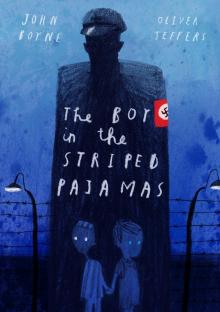 The Boy in the Striped Pajamas
The Boy in the Striped Pajamas Next of Kin
Next of Kin The House of Special Purpose
The House of Special Purpose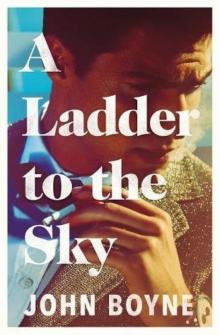 A Ladder to the Sky
A Ladder to the Sky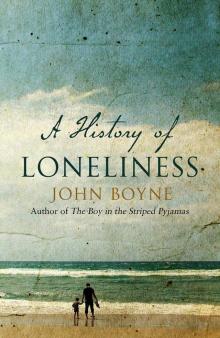 A History of Loneliness
A History of Loneliness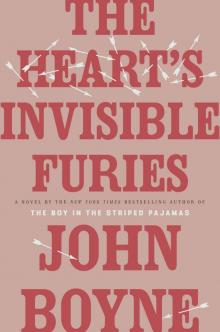 The Heart's Invisible Furies
The Heart's Invisible Furies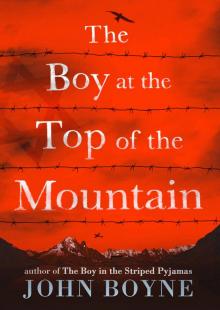 The Boy at the Top of the Mountain
The Boy at the Top of the Mountain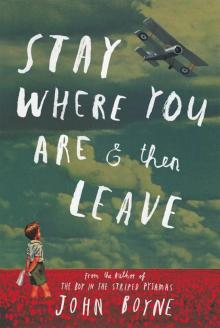 Stay Where You Are and Then Leave
Stay Where You Are and Then Leave Crippen: A Novel of Murder
Crippen: A Novel of Murder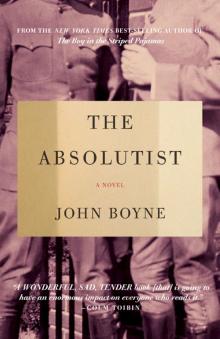 The Absolutist
The Absolutist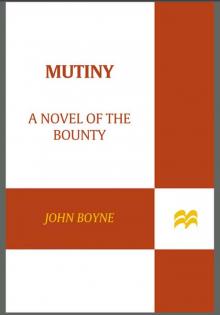 Mutiny: A Novel of the Bounty
Mutiny: A Novel of the Bounty A Traveler at the Gates of Wisdom
A Traveler at the Gates of Wisdom The Congress of Rough Riders
The Congress of Rough Riders The Thief of Time
The Thief of Time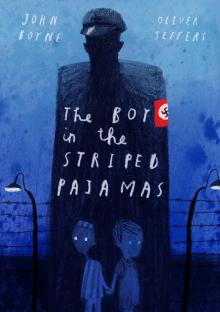 The Boy in the Striped Pajamas (Deluxe Illustrated Edition)
The Boy in the Striped Pajamas (Deluxe Illustrated Edition)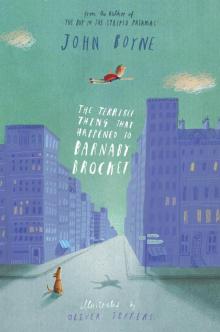 The Terrible Thing That Happened to Barnaby Brocket
The Terrible Thing That Happened to Barnaby Brocket The Boy In The Striped Pyjamas
The Boy In The Striped Pyjamas Crippen
Crippen